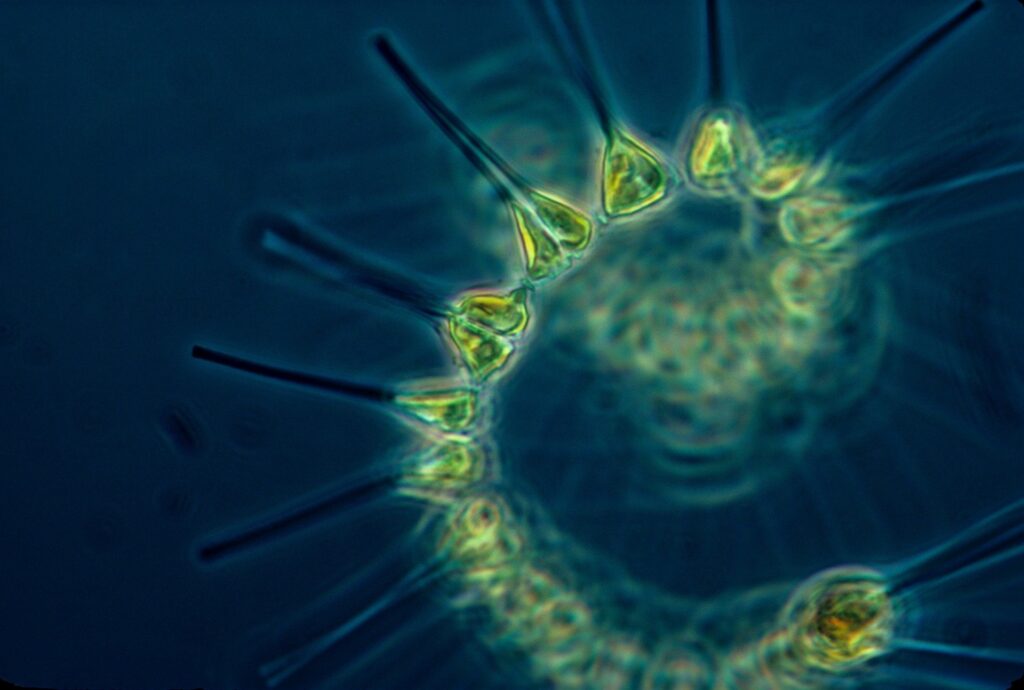
Plankton, often overlooked due to their microscopic size and hidden aquatic habitats, play a crucial role in our planet’s ecological balance, climate regulation, and even cultural practices. Despite their invisibility to the naked eye, these tiny organisms are indispensable to human life and the environment.
The term “plankton” derives from the ancient Greek word for “drifter,” aptly describing these organisms that float in oceans, lakes, rivers, and even groundwater. Plankton encompasses a variety of life forms, including viruses, bacteria, insects, larval fish, and jellyfish, all united by their drifting nature. They are categorized into plant-like phytoplankton and animal-like zooplankton, with some species exhibiting characteristics of both.
Understanding Plankton’s Ecological Role
A global consortium of researchers, known as the Plankton Passionates, has been investigating the myriad ways plankton contribute to ecological and human well-being. Published in BioScience, their research identifies six broad themes highlighting plankton’s value.
Phytoplankton, through photosynthesis, generate biomass that sustains aquatic food webs, similar to terrestrial plants. Zooplankton consume phytoplankton, becoming prey for fish such as sardines and herring, which are then eaten by larger predators. This intricate food web underscores the importance of plankton in maintaining ecological balance.
Plankton also influence the biogeochemistry of aquatic environments. Phytoplankton absorb carbon dioxide (CO2) and, when consumed by zooplankton, contribute to the biological carbon pump—a process that sequesters carbon in deep waters, mitigating climate change. Meanwhile, bacteria and fungi decompose organic matter, recycling essential nutrients.
Plankton in Science and Innovation
Plankton have significantly advanced scientific understanding and innovation. Their diverse forms have inspired ecological theories and frameworks, such as the competitive exclusion principle by Russian biologist Georgy Gause. This principle, derived from plankton studies, is now applied in various socioeconomic contexts.
Research on plankton has led to groundbreaking discoveries, including Nobel Prize-winning studies in medicine. For example, the study of jellyfish proteins has enhanced knowledge of aging and cancer, while freshwater ciliate telomeres have contributed to genetic research.
“Plankton are foundational to aquatic food webs and critical to human economies,” experts note, emphasizing their role in both ecological and economic systems.
In forensic science and biomedical research, certain plankton species serve as diagnostic tools and model organisms. Their economic significance is evident in the cultivation of planktonic organisms like jellyfish, krill, and shrimp for human consumption, and their use in supplements and pharmaceuticals.
Cultural and Economic Impacts of Plankton
Beyond their ecological and scientific contributions, plankton hold cultural significance. Bioluminescent marine dinoflagellates create stunning nighttime displays, attracting tourists and inspiring cultural events. The silica-rich skeletons of diatoms have historical uses in tools and jewelry.
Plankton’s unique structures have influenced architecture and design, inspiring landmarks such as Milan’s Galleria Vittorio Emmanuele. Artists, including biologist Ernst Haeckel, have drawn inspiration from plankton’s intricate forms.
The Intergovernmental Science-Policy Platform on Biodiversity and Ecosystem Services emphasizes the importance of living in harmony with nature, recognizing plankton’s role in biodiversity and ecosystem services.
The Future of Plankton Research and Conservation
As humanity continues to grapple with environmental challenges, the recognition of plankton’s value becomes increasingly vital. Their role in climate regulation, cultural practices, and economic systems underscores the need for conservation efforts and sustainable management.
Plankton’s impact extends beyond coastal communities, influencing art, design, and science worldwide. Their diversity and ecological functions are integral to Earth’s stability, highlighting the interconnectedness of all life forms.
In conclusion, plankton are not merely drifters in aquatic environments but are essential components of Earth’s ecological framework. As we strive to understand and protect our planet, acknowledging the significance of these tiny organisms is crucial for future generations.







